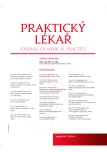-
Medical journals
- Career
Targeted treatment of bronchogenic carcinoma
Authors: M. Černovská
Authors‘ workplace: Přednostka: prof. MUDr. Martina Vašáková, PhD ; 1. lékařská fakulta a Thomayerova nemocnice ; Pneumologická klinika 1. LF UK a TN ; Univerzita Karlova v Praze
Published in: Prakt. Lék. 2020; 100(1): 3-7
Category: Reviews
Overview
Targeted cancer therapies are drugs or other substances that block the growth and spread of cancer by interfering with specific molecules ("molecular targets") that are involved in the growth, progression, and spread of cancer. Targeted cancer therapies are sometimes called "molecularly targeted therapies". Targeted drugs work differently from standard chemotherapy. It is a type of treatment that uses drugs to attack cancer cells with EGFR or ALK gene changes (EGFR and ALK inhibitors) or block new blood tumour vessel growth (angiogenesis inhibitors). At present, target therapy is part of the routine management for patients with nonsmall cell lung cancer (NSCLC), especially in advanced stages
Keywords:
Angiogenesis – mutations – targeted therapy – EGFR – ALK
Sources
1. Gelatti ACZ, Drilon A, Santini FC. Optimizing the sequencing of tyrosine kinase inhibitors (TKIs) in epidermal growth factor receptor (EGFR) mutation-positive non-small cell lung cancer (NSCLC). Lung Cancer 2019; 137 : 113–122.
2. Planchard D, Popat S, Kerr K, et al. Metastatic Non-Small-Cell Lung Cancer: ESMO clinical practice guidelines for diagnosis, treatment and follow-up. Ann Oncol 2018; 29(Suppl 4): iv192–iv237.
3. Horn L, Mansfield A, Szczęsna A. First-Line Atezolizumab plus chemotherapy in extensive-stage Small-Cell Lung Cancer. N Engl J Med 2018; 379 : 2220–2229.
4. Skřičková J, Kolek V, a kol. Základy moderní pneumoonkologie II. Praha: Maxdorf 2017.
5. Ryška A, Petruželka L, Skřičková J, a kol. Interdisciplinární konsenzus pro prediktivní vyšetřování u nemalobuněčného karcinomu plic (NSCLC). Studia pneumologica et phthiseologica 2012; 72(3): 168.
6. Lee CK, Wu YL, Ding PN, et al. Impact of specific epidermal growth factor receptor (EGFR) mutation and clinical charakteristics on outcomes after treatment with EGFR tyrosine kinase inhibitors versus chemotherapy in EGFR-mutant lung cancer. J Clin Oncol 2015; 33(17): 1958–1965.
7. Cross DA, Ashton SE, Ghiorghiu S, et al. AZD9291, an irreversible EGFR TKI, overcomes T790M-mediated resistance to EGFR inhibitors in lung cancer. Cancer Discov 2014; 4(9): 1046–1061.
8. Yasuda H, Park E, Yun CH, et al. Structural, biochemical, and clinical characterization of epidermal growth factor receptor (EGFR) exon 20 insertion mutations in lung cancer. Sci Transl Med 2013; 5(216): 216ra177.
9. Seto T, Kato T, Nishio M, et al. Erlotinib alone or with bevacizumab as first-line therapy in patients with advanced non-squamous non-small-cell lung cancer harbouring EGFR mutations (JO25567): an open-label, randomised, multicentre, phase 2 study. Lancet Oncol 2014; 15(11): 1236–1244.
10. Sandler A, Gray R, Perry MC, et al. Paclitaxel-carboplatin alone or with bevacizumab for non-small-cell lung cancer. N Engl J Med 2006; 355 : 2542–2550.
11. Harari PM. Epidermal growth factor receptor inhibition strategies in oncology. Endocr Relat Cancer 2004; 11(4): 689–708.
12. Gandhi S, Chen H, Zhao Y, Dy GK. First-line treatment of advanced ALK-positive non-small-cell lung cancer. Lung Cancer (Auckl) 2015; 6 : 71–82.
13. Amin A, Ersek J, Kim ES, O’Day S. Immunooncology. Bevacizumab mechanism of action [online]. Dostupné z: https://www.healio.com/hematology-oncology/learn-immuno-oncology/clinical-indications/colorectal-cancer [cit. 2019-11-19]
Labels
General practitioner for children and adolescents General practitioner for adults
Article was published inGeneral Practitioner

2020 Issue 1-
All articles in this issue
- Targeted treatment of bronchogenic carcinoma
- „Second hand drinking” or harm that alcohol causes to other people
- Using honey dressing in treatment of non-healing wounds in elderly
- Pelvic venous congestion syndrome in clinical practice of angiologist’s point of view
- Selected risk factors of patients’ falls in hospitals: low BMI, hypotension, increased heart rate, hypoglycaemia, anaemia
- Patients with limited legal capacity in general practitioners’ surgeries: what is new in Czech legislation
- Hypercholesterolemia therapy by PCSK9 inhibitors
- Krátké zamyšlení nad významem vlasů v životě jedince
- Velký úklid mozku při spánku pomáhá v prevenci Alzheimerovy nemoci
- Vincenz Priessnitz (1799–1852) – propagátor vodoléčby a zakladatel prvních vodoléčebných lázní na světě
- Stomický pacient v ordinaci praktického lékaře
- Nové způsoby pro snížení antibakteriální rezistence ve zdravotnických zařízeních – projekt mezinárodní spolupráce AMICI
- Testy a dotazníky pro vyšetřování kognitivních funkcí, nálady a soběstačnosti
- General Practitioner
- Journal archive
- Current issue
- Online only
- About the journal
Most read in this issue- Patients with limited legal capacity in general practitioners’ surgeries: what is new in Czech legislation
- Using honey dressing in treatment of non-healing wounds in elderly
- Pelvic venous congestion syndrome in clinical practice of angiologist’s point of view
- Hypercholesterolemia therapy by PCSK9 inhibitors
Login#ADS_BOTTOM_SCRIPTS#Forgotten passwordEnter the email address that you registered with. We will send you instructions on how to set a new password.
- Career

